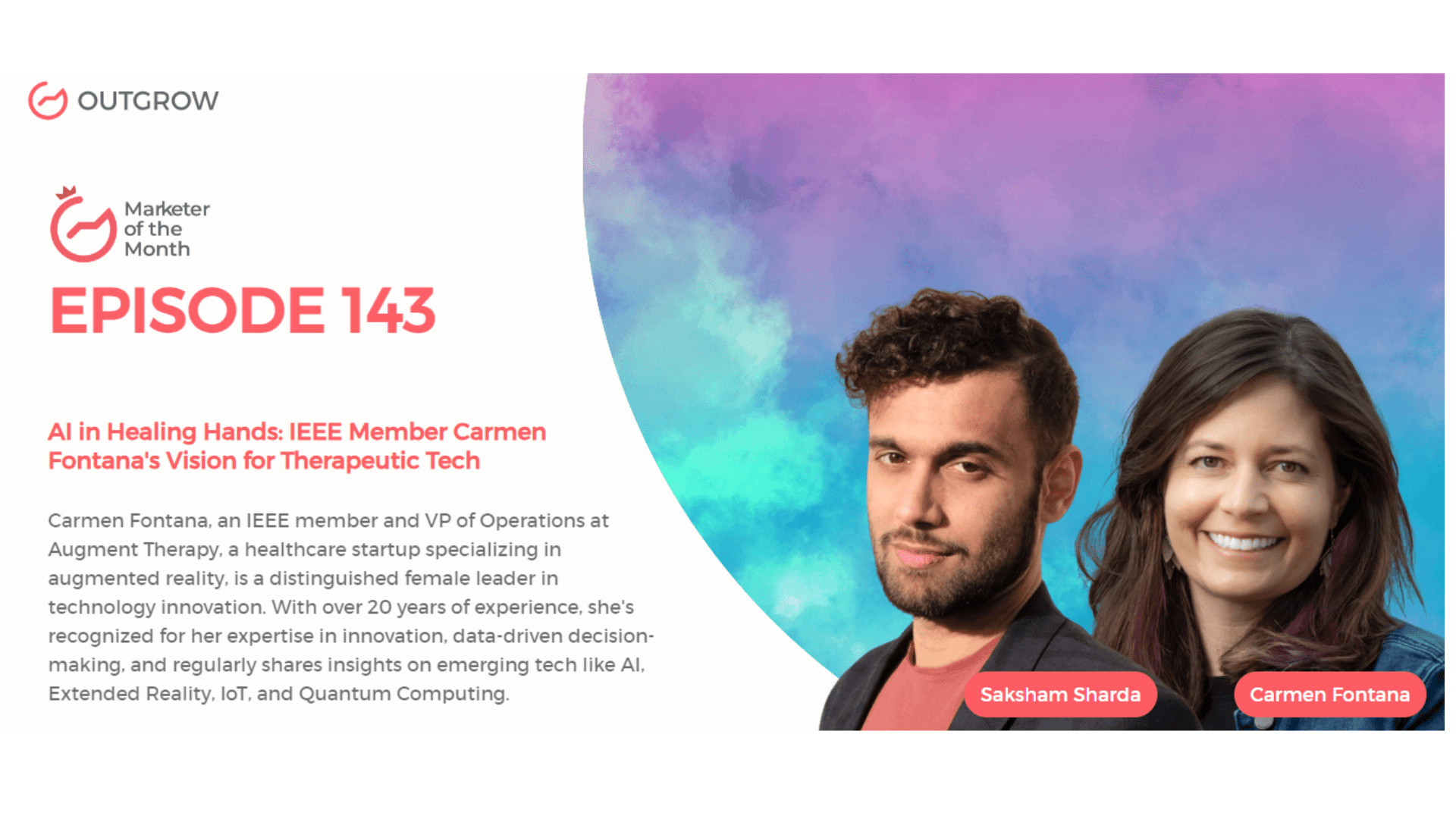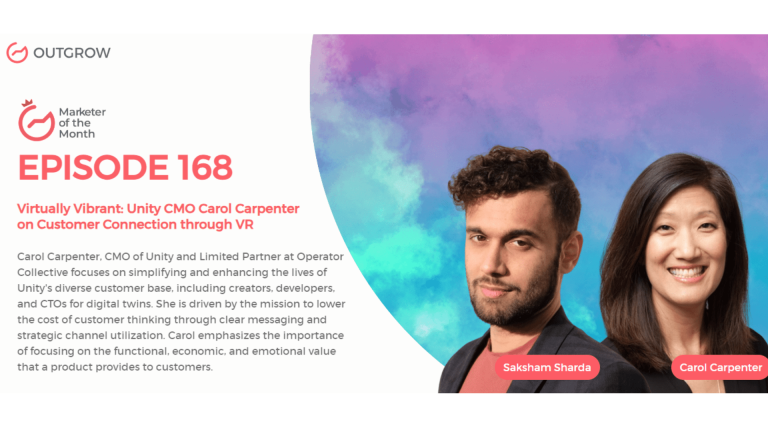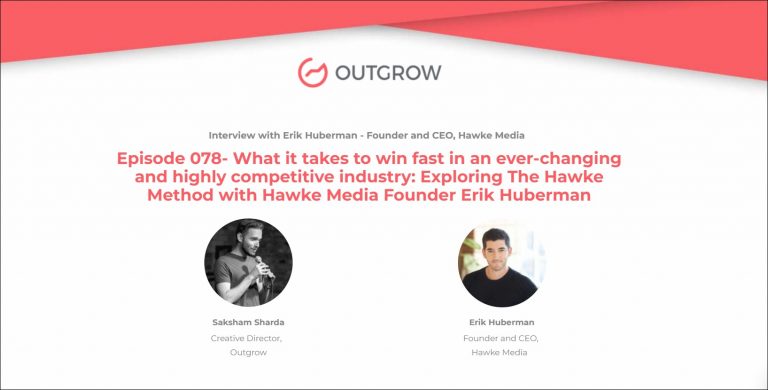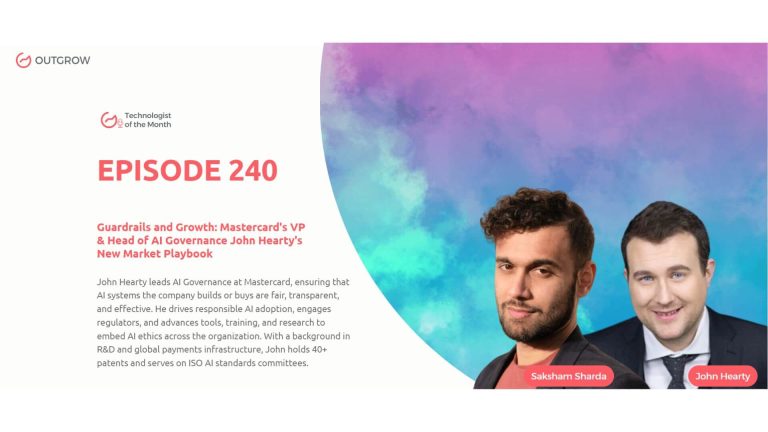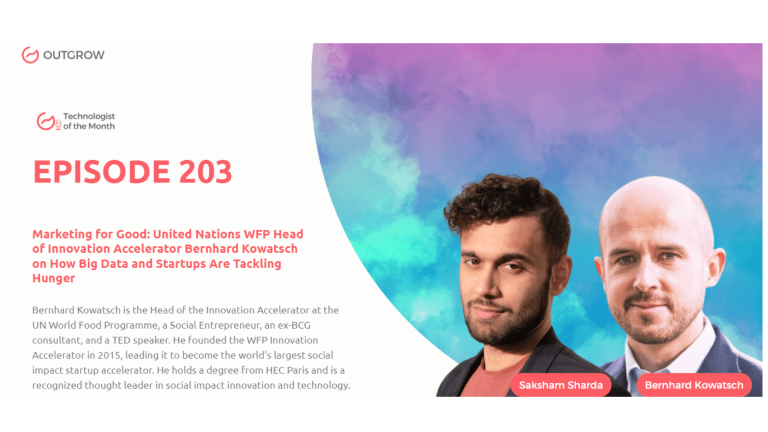EPISODE 143: Marketer of the Month Podcast with Carmen Fontana
Table of Contents
Hey there! Welcome to the Marketer Of The Month blog!
We recently interviewed Carmen Fontana for our monthly podcast – ‘Marketer of the Month’! We had some amazing insightful conversations with Carmen and here’s what we discussed about-
1. Augment Therapy: Leveraging AR for healthcare through gamified therapy.
2. Engaging Pediatric Cancer Patients: Gamification addressing mobility challenges.
3. AI-Enhanced Monitoring: Tracking skeletons and finger movements in therapy.
4. Beyond Gaming: XR applications expanding into healthcare and more.
5. Non-Wearable Priority: Augment Therapy’s focus on non-invasive AR solutions.
6. Diversity, Leadership, and Inclusion: Vital principles in the tech field.
About our host:
Dr. Saksham Sharda is the Chief Information Officer at Outgrow.co. He specializes in data collection, analysis, filtering, and transfer by means of widgets and applets. Interactive, cultural, and trending widgets designed by him have been featured on TrendHunter, Alibaba, ProductHunt, New York Marketing Association, FactoryBerlin, Digimarcon Silicon Valley, and at The European Affiliate Summit.
About our guest:
Carmen Fontana, an IEEE Member and Vice President of Operations at Augment Therapy, a healthcare startup specializing in augmented reality, is a distinguished female leader in technology innovation. With over 20 years of experience, she’s recognised for her expertise in innovation, and data-driven decision-making, and regularly shares insights on emerging tech like Artificial Intelligence, Extended Reality, IoT, and Quantum Computing.
AI in Healing Hands: IEEE Member Carmen Fontana’s Vision for Therapeutic Tech
The Intro!
Saksham Sharda: Hi, everyone. Welcome to another episode of Outgrow’s Marketer of the Month. I’m your host, Dr. Saksham Sharda, and I’m the creative director at Outgrow. co. And for this month we are going to interview Carmen Fontana who is a Member of IEEE.
Carmen Fontana: Great to be here. Thank you.
Don’t have time to read? No problem, just watch the Podcast!
Or you can just listen to it on Spotify!
The Rapid Fire Round!
Saksham Sharda: We’ll start with the rapid-fire round, okay, if there’s any question you don’t want to answer, you can say pass. All right. The first one is at what age do you want to retire?
Carmen Fontana: Yesterday? Does that count?
Saksham Sharda: What’s your favorite mobile app?
Carmen Fontana: I am a big runner. So I gotta say Strava as addictive as it is.
Saksham Sharda: How long does it take you to get ready in the mornings?
Carmen Fontana: I work from home so tragically, not that long,
Saksham Sharda: Most embarrassing moment of your life.
Carmen Fontana: Pass.
Saksham Sharda: Mountains or beaches.
Carmen Fontana: I am a mountain girl who skis or trails.
Saksham Sharda: What’s the most useful mobile feature you can’t live without?
Carmen Fontana: So going back to being a runner, it’s using my wearables and being able to track my exercise for my mobile apps.
Saksham Sharda: Favorite color?
Carmen Fontana: Black.
Saksham Sharda: What time of day are you most inspired?
Carmen Fontana: Mid-afternoon when I get my caffeine, and that kicks in, and I’m ready for the second half.
Saksham Sharda: How many hours of sleep can you survive?
Carmen Fontana: I have to have a full night’s sleep, or I’m ugly.
Saksham Sharda: Fill in the blank. An upcoming marketing trend is ____.
Carmen Fontana: Pass
Saksham Sharda: The city in which the Best Kiss of your life happened
Carmen Fontana: Where I met my husband.
Saksham Sharda: Pick one. Apple or Android?
Carmen Fontana: Apple.
Saksham Sharda: The biggest mistake of your career.
Carmen Fontana: As a woman, I sometimes didn’t take opportunities because I didn’t see people like myself in those roles. So I wish I had been bolder.
Saksham Sharda: How do you relax?
Carmen Fontana: I like to exercise or just zone out on the web.
Saksham Sharda: How many cups of coffee do you drink?
Carmen Fontana: Zero. I’m a tea drinker.
Saksham Sharda: A habit of yours that you hate?
Carmen Fontana: Pass.
Saksham Sharda: The most valuable skill that you’ve learned in life?
Carmen Fontana: People skills.
Saksham Sharda: Cities or countryside?
Carmen Fontana: I like a little bit of both. I’m a City Mouse and a Country Mouse.
Saksham Sharda: Alright, the last one is your favorite Netflix show.
Carmen Fontana: Pass.
Saksham Sharda: Do you want to say an Amazon show? Or any show?
Carmen Fontana: I know I like them all. I’m trying to think what I’m into right now. I’ve been watching Billions a lot.
The Big Questions!
Saksham Sharda: All right, so the longer questions are gonna be answered with as much ease and time as you like. So no rush to these. How does augment therapy software help therapists accumulate and analyze objective data? Can you provide some examples of the insights this data can provide?
Carmen Fontana: I think augmented therapy is an augmented reality healthcare company. And basically, what we do is create augmented reality gamified experiences for physical therapy and occupational therapy. So one of the use cases that we have is children that are on cancer floors of hospitals, they have to move. It’s great for their health and well-being. But because of infection control, their bodies aren’t acclimated well. It’s hard for them to get out of the room to get that exercise, you couple that with the lack of caregivers due to the pandemic and the children have been suffering. So what we do is create a gamified solution that uses an Apple device in their room projects on TV, they see themselves, they see digital images, and they’re grabbing for things or running through things. And they think they’re playing a game. So they’re more willing to engage in their therapy experience. But for the therapists, what they’re getting is objective data. Before that, it was very subjective. They’d see a range of motion and think maybe that’s 47 degrees, but in reality, it’s 53. And that patient has had improvement so they can see how much their patient has done the exercises and how they’re improving
Saksham Sharda: So can you tell us about your recent innovation or improvement in augmented therapy technology that you are particularly excited about?
Carmen Fontana: Yeah, so augmented reality is an ever-evolving technology. When we first started the company, we were using Microsoft Kinect devices because that was the best that was out there. Then Apple came out with the LIDAR technology, which improved our game. And now AI and visual recognition have improved so much that we’re able to move in that direction. It does a way better job of monitoring the skeletons, which is important, a lot of our patients need a caregiver with them. And so being able to figure out which skeleton is the right one is important. But it also allows us to do fingers and people are like fingers. But fingers are really important for occupational therapy. So think about writing, and picking up stuff. So being able to do finger movements is huge. And when we’re talking about pediatric patients, a lot of their stuff is they do air writing, so they write the letters, and so we’re able to project the letters on the screen, and they can use their fingers to do the motion. So I’m excited about the AI technology, it’s just gonna allow us to do so much more for our patients.
Saksham Sharda: So is it also an extended drawing or like the art of some sort?
Carmen Fontana: Absolutely. We’re moving into geriatrics as well. And so for them, we would want to add a cognitive function. So we may have put these things in order. So they use their fingers to move things around in order. So they’re working on their cognitive but also their fine motor skills.
Saksham Sharda: Extended reality is an emerging technology that includes VR, augmented reality AR, and mixed reality, MR. How do you see XR transforming the way we interact with the world around us?
Carmen Fontana: There are a lot of interesting use cases with XR. Everybody thinks about gaming, that’s where XR started. I mentioned augmenting therapy. There are a lot of interesting use cases with healthcare. But I’m also intrigued by things like manufacturing and construction. I saw one of the vendors down there had AR goggles for construction, where you can overlay data or schematics as you’re looking at something that would help with repairs. So there are a lot of interesting, more practical use cases that I think are the next step for XR.
Saksham Sharda: And what phases does your company plan to use?
Carmen Fontana: Yes, at augment therapy, we plan to continue to lean into augmented reality. We prefer not to use wearables, so headsets and that sort of thing, mainly because we’re in the healthcare space. And there are two challenges there. Infection Control, which we know from a COVID standpoint is important. But also we work with sensitive populations, so people with autism or complex medical needs, don’t want to have something on their face or their body.
Saksham Sharda: So how does your own experience as a cancer survivor influence your perspective on the role of technology in healthcare?
Carmen Fontana: When I went through cancer treatment, it helped me understand the obstacles to health care. I felt like I was very lucky. I had strong insurance. I live right down the road from the Cleveland Clinic, one of the best hospitals in the world, flexible job, and all that good stuff. I spoke English and reliable transportation, those are a lot of hurdles that most people don’t have. And so we saw in the pandemic that there was a huge healthcare disparity between the haves and the have-nots. And so that’s why I think digital health is so important because it allows us to bridge that gap and bring healthcare into homes or where those folks live.
Saksham Sharda: Is there some kind of government funding available for this? How does this happen?
Carmen Fontana: Yeah, obviously, different countries fund healthcare in different ways. In the United States, we’re seeing a lot of interest from hospitals, but particularly from payers, so health insurance companies see an opportunity to reach vulnerable populations with augmented reality, virtual reality, and digital health in general, as well as a way to reduce healthcare costs a lot of the things around exercise and general well being, they have outsized proportions in terms of the outcomes versus the amount spent to implement them.
Saksham Sharda: So in your profile, you’ve also indicated that you’re passionate about diversity and inclusion, how do you incorporate these values into your work? And have you seen any positive impacts as a result?
Carmen Fontana: I’m a big believer in that you can’t be what you can’t see. And when I was early in my career as an engineer, there weren’t a lot of women engineers to look up to. And so I kind of floundered in those early years because I didn’t know what to do or where to go. And I didn’t feel like I was included. So now that I’m further along in my career, I think it’s really important for me to be up, be shown up, and show everybody where I’m at so that people earlier in their career can say, hey, I can be a diverse person and have a career in technology.
Saksham Sharda: So you’ve worked with various companies throughout your career. What do you think are the benefits and challenges of working in different environments? And how do you adapt your leadership style to different cultures?
Carmen Fontana: Big companies have really interesting things, and they also have big struggles. Same with small companies. With big companies. You learned the importance of process and having set controls. But you can also be hindered by the big behemoth of the corporation, small companies, you learn to be creative and nimble, but sometimes you wish for a little bit more process. So being at different companies of different sizes and different flavors has allowed me to stretch as a leader and develop new skills.
Saksham Sharda: Do you find it easier working in the phrase you are in? Or your previous companies? What do you think is challenging?
Carmen Fontana: I love working in startups because it’s crazy. Every day is different. You are learning stuff on the fly. You know, certainly, there are days where I wish there was somebody else to handle that marketing department or, you know, some other operational department and startup everyone do everything. But I’d say, All in all, startups are incredibly fun.
Saksham Sharda: So what are your thoughts on the sudden boom of AI tools like chat GPT and Google’s introduction of BARD, do you believe that AI will be the future? Or that the craze will sort of fade out? And how can it be useful to have these tools?
Carmen Fontana: My only surprise about chat GPT is that everyone’s surprised about it. Like, I feel like we’ve already been on this trajectory. It just was an interesting use case that caught a lot of people’s attention. For AI to be smart and useful. You need processing power, you need smart algorithms, and you need training datasets. And all three of those have been advancing at a steady clip over the last couple of years. Certainly, the chips are getting more powerful, they can do a lot more things efficiently. The algorithms, there are so many people working on doing interesting stuff there. And then we’re just accumulating more and more data. For instance, Chat GTP needed a lot of human interaction, human voice, and human written word to be smart. And they’ve been accumulating that, so it’s kind of all that’s coming together. We’re just getting started with AI.
Saksham Sharda: The last question for you is a little personal. What would you be doing in your life if not this right now?
Carmen Fontana: It’s so hard to say because I have enjoyed working in tech ever since I was a little girl with my Commodore 128 Which I’m dating myself. I’ve just enjoyed whatever the next big thing is. And I love working in emerging tech because it’s full of possibilities. So other than being retired and living in the mountains, I love what I’m doing.
Let’s Conclude!
Saksham Sharda: Thanks, everyone for joining us for this month’s episode of Outgrow’s Marketer of the Month. That was Carmen Fontana who is a Member of IEEE.
Carmen Fontana: Pleasure. Thanks for having me.
Saksham Sharda: Check out the website for more details and we’ll see you once again next month with another marketer of the month.

Muskan is a Marketing Analyst at Outgrow. She is working on multiple areas of marketing. On her days off though, she loves exploring new cafes, drinking coffee, and catching up with friends.

